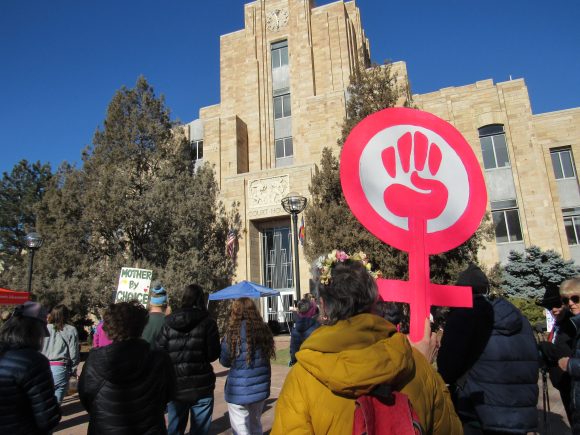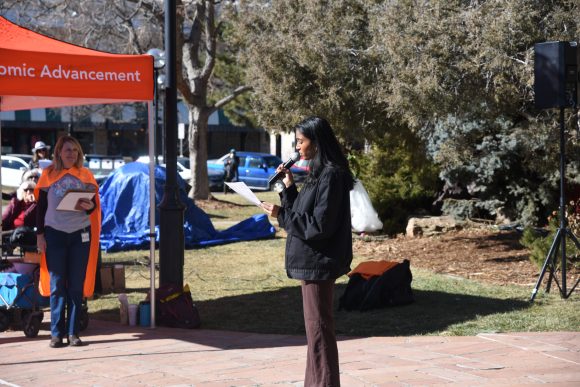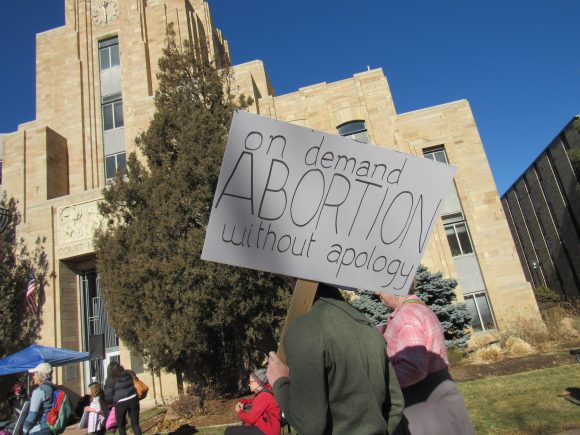
A protestor holds up a sign in front of the Boulder County Courthouse at a protest to enshrine abortion rights into the state constitution on Jan. 27, 2024. (Jessi Sachs/ CU Independent)
Abortion rights advocates and community members gathered at the Boulder County Courthouse on Saturday, Jan. 27 to encourage support for Initiative 89 which would enshrine rights to abortion access into the Colorado Constitution.
Following the Supreme Court’s 2022 decision overturning Roe v. Wade, 12 states have enacted near-total bans on abortion, two have ceased providing abortion care and four have instituted gestational age restrictions. Abortion remains legal in Colorado and is protected under several laws.
“No state is safe from politics,” said Laura Chapin, a spokesperson for Cobalt, a Colorado non-profit advocating abortion access and reproductive rights. “As we’ve learned in other states… politicians and state legislatures can change. And when you put it in the Constitution and the state can guarantee it, that can’t be taken away as easily.”
Cobalt partnered with YWCA Boulder County, a self-described “women’s movement”, which hosted the event and invited speakers such as University of Colorado Boulder senior and member of CU Student Government, Nimisha Mallela.
“[After the overturning of Roe v. Wade] I felt grateful for the privilege of living in Colorado where reproductive rights were still affirmed, at least for the time being,” Mallela said. “I realized that even this privilege was unreliable and the fight for comprehensive reproductive rights needed amplification in my community.”

CU Boulder senior and student government member Nimisha Mallela gives a speech on abortion rights at a rally at the Boulder County Courthouse on Saturday, Jan. 27. (Ann Marie Vanderveen/ CU Independent)
As a CUSG member, Mallela said the organization is working on making pregnancy tests available to students for free and offering abortion pills at the pharmacy in Wardenburg Health Center. In July, CUSG passed a bill to fund free and discounted emergency contraceptives on campus. Mallela said this has reduced barriers to health resources and provided relief to students with concerns about reproductive health.
The politics surrounding abortion rights can also affect out-of-state students who made up 43% of those enrolled at CU Boulder in the 2023 fall census.
“How we support [out-of-state students] is let them know that there is help here in Colorado,” said Dani Newsum, a CU Boulder alum and the director of strategic partnerships for Cobalt.
Deborah Parks, a member of YWCA Boulder County, said her family was particularly impacted by these politics. Parks is from Texas and has two granddaughters who still live there. She said she was “appalled” by the abortion ban there but is doing what she can to protect abortion rights in Colorado.
“You’re so young and so many college students really don’t understand the importance of birth control,” said Parks. “And if they get into trouble, they need somewhere to go… In other states, they have no ability to do that.”
Colorado has no residency requirements for receiving an abortion and has become a haven for those in states with abortion bans.
According to the Colorado Department of Public Health and Environment, the number of abortions performed on out-of-state residents increased from 13.6% in 2021 to 27.9% in 2022, the year in which the Supreme Court overturned Roe v. Wade and the most recent year from which data is available.
2,418 of the 14,154 total abortions performed in Colorado in 2022 were performed on Texas residents and Texas was the second most common state of origin for those seeking abortions in Colorado after in-state residents.
Texas is also the third most common state of residence for CU students, making up 3.6% of the total student population.
For some students in a post-Roe world, the state of reproductive rights is impacting where they choose to attend college.
“As I grow up and go on to college I become more worried,” said Cara Wong, a senior at Boulder’s Fairview High School who spoke at the demonstration. “Why, when researching colleges, was googling the abortion rights in a state a part of it?”

A protestor holds up a sign in front of the Boulder County Courthouse at a protest to enshrine abortion rights into the state constitution on Jan. 27, 2024. (Jessi Sachs/ CU Independent)
Parks stated YWCA Boulder County was seeking 185,000 signatures across the state and 6,000 in senate districts 17 and 18 (which encompass Boulder and Longmont among other localities).
“The fight isn’t over,” said Newsum. “We are not safe, although we are lucky to live in Colorado… we are still not safe because anti-abortion politicians, anti-abortion politics is driving this issue and it is driving it nationally.”
Contact CU Independent News Editor Jessi Sachs at Jessica.Sachs@colorado.edu.
